Tourism and Society: Examining Impacts, Theories, and Sustainability
VerifiedAdded on 2023/06/05
|10
|2723
|319
Essay
AI Summary
This essay provides a comprehensive analysis of the impacts of tourism on society, drawing upon sociological theories, principles, and practices. It examines the relationship between tourism and society, utilizing models like the tourism life cycle model and stakeholder management. The essay explores both the positive and negative impacts of tourism, considering factors such as economic benefits, environmental degradation, and socio-cultural changes. It incorporates a PESTLE analysis to assess the external environment's influence on the tourism sector. Furthermore, the essay delves into tourist behavior and expectations, highlighting their impact on destinations and societies, and concludes by emphasizing the importance of sustainable tourism practices to maximize benefits while minimizing negative consequences. The document is contributed by a student and is available on Desklib, a platform offering AI-based study tools.
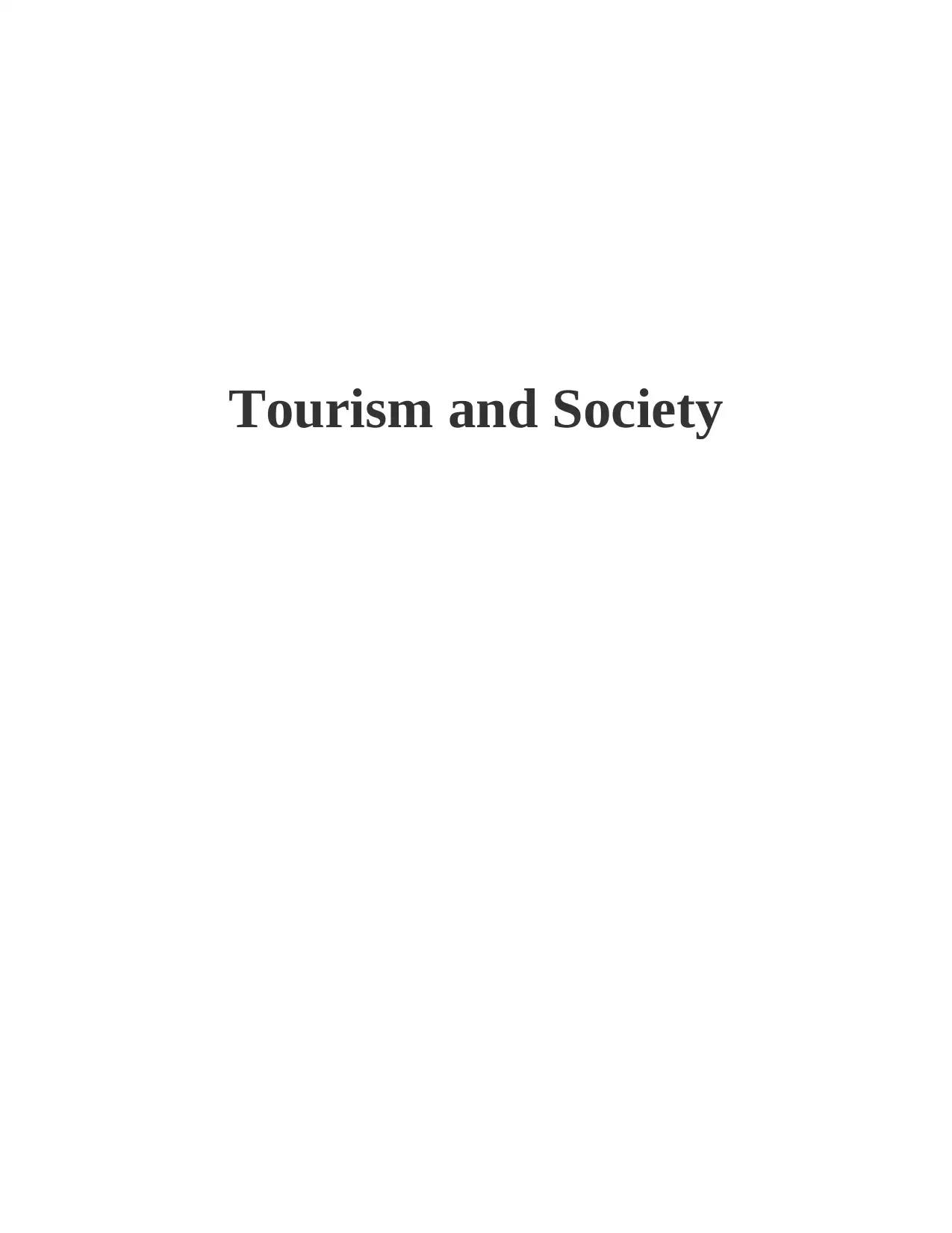
Tourism and Society
Paraphrase This Document
Need a fresh take? Get an instant paraphrase of this document with our AI Paraphraser
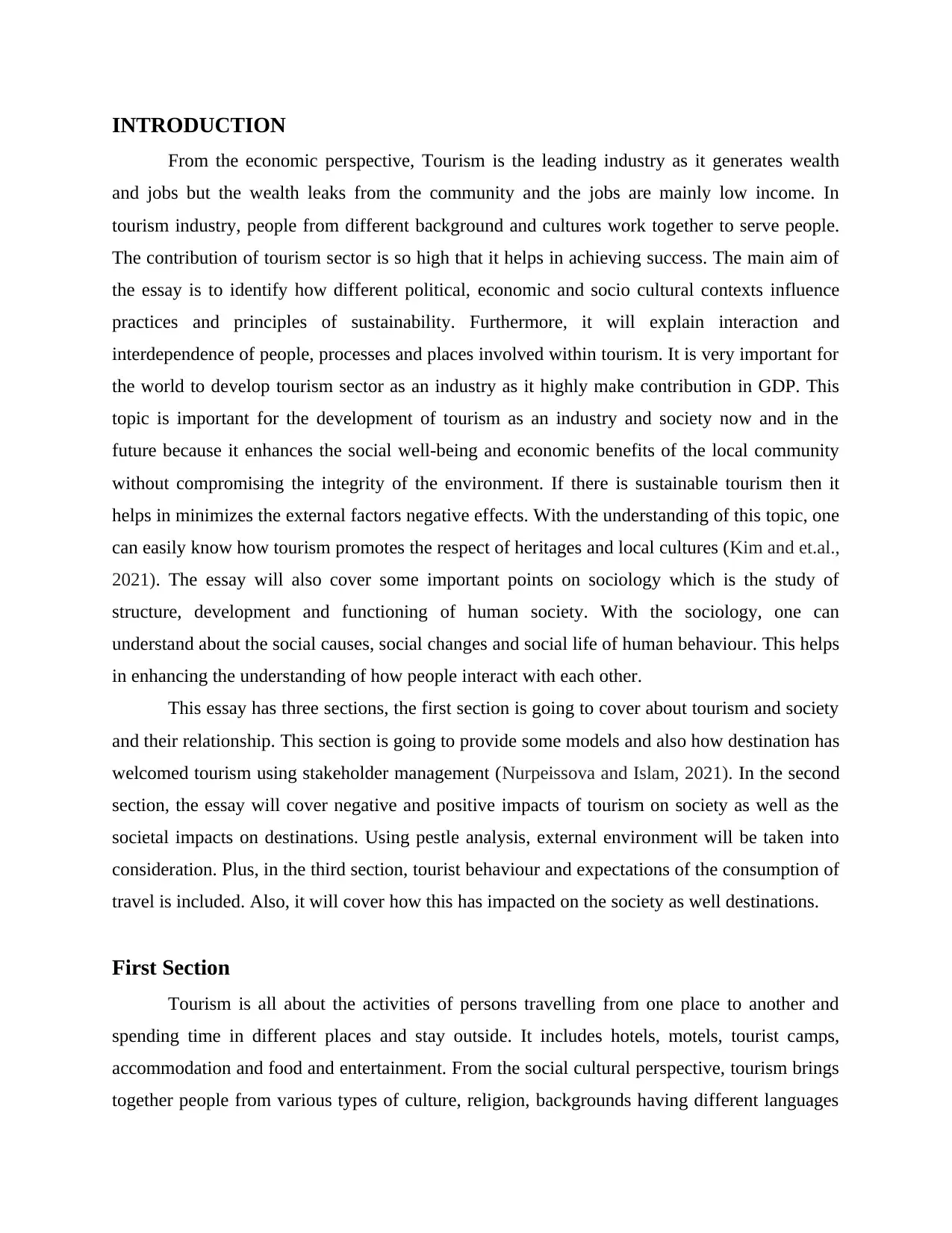
INTRODUCTION
From the economic perspective, Tourism is the leading industry as it generates wealth
and jobs but the wealth leaks from the community and the jobs are mainly low income. In
tourism industry, people from different background and cultures work together to serve people.
The contribution of tourism sector is so high that it helps in achieving success. The main aim of
the essay is to identify how different political, economic and socio cultural contexts influence
practices and principles of sustainability. Furthermore, it will explain interaction and
interdependence of people, processes and places involved within tourism. It is very important for
the world to develop tourism sector as an industry as it highly make contribution in GDP. This
topic is important for the development of tourism as an industry and society now and in the
future because it enhances the social well-being and economic benefits of the local community
without compromising the integrity of the environment. If there is sustainable tourism then it
helps in minimizes the external factors negative effects. With the understanding of this topic, one
can easily know how tourism promotes the respect of heritages and local cultures (Kim and et.al.,
2021). The essay will also cover some important points on sociology which is the study of
structure, development and functioning of human society. With the sociology, one can
understand about the social causes, social changes and social life of human behaviour. This helps
in enhancing the understanding of how people interact with each other.
This essay has three sections, the first section is going to cover about tourism and society
and their relationship. This section is going to provide some models and also how destination has
welcomed tourism using stakeholder management (Nurpeissova and Islam, 2021). In the second
section, the essay will cover negative and positive impacts of tourism on society as well as the
societal impacts on destinations. Using pestle analysis, external environment will be taken into
consideration. Plus, in the third section, tourist behaviour and expectations of the consumption of
travel is included. Also, it will cover how this has impacted on the society as well destinations.
First Section
Tourism is all about the activities of persons travelling from one place to another and
spending time in different places and stay outside. It includes hotels, motels, tourist camps,
accommodation and food and entertainment. From the social cultural perspective, tourism brings
together people from various types of culture, religion, backgrounds having different languages
From the economic perspective, Tourism is the leading industry as it generates wealth
and jobs but the wealth leaks from the community and the jobs are mainly low income. In
tourism industry, people from different background and cultures work together to serve people.
The contribution of tourism sector is so high that it helps in achieving success. The main aim of
the essay is to identify how different political, economic and socio cultural contexts influence
practices and principles of sustainability. Furthermore, it will explain interaction and
interdependence of people, processes and places involved within tourism. It is very important for
the world to develop tourism sector as an industry as it highly make contribution in GDP. This
topic is important for the development of tourism as an industry and society now and in the
future because it enhances the social well-being and economic benefits of the local community
without compromising the integrity of the environment. If there is sustainable tourism then it
helps in minimizes the external factors negative effects. With the understanding of this topic, one
can easily know how tourism promotes the respect of heritages and local cultures (Kim and et.al.,
2021). The essay will also cover some important points on sociology which is the study of
structure, development and functioning of human society. With the sociology, one can
understand about the social causes, social changes and social life of human behaviour. This helps
in enhancing the understanding of how people interact with each other.
This essay has three sections, the first section is going to cover about tourism and society
and their relationship. This section is going to provide some models and also how destination has
welcomed tourism using stakeholder management (Nurpeissova and Islam, 2021). In the second
section, the essay will cover negative and positive impacts of tourism on society as well as the
societal impacts on destinations. Using pestle analysis, external environment will be taken into
consideration. Plus, in the third section, tourist behaviour and expectations of the consumption of
travel is included. Also, it will cover how this has impacted on the society as well destinations.
First Section
Tourism is all about the activities of persons travelling from one place to another and
spending time in different places and stay outside. It includes hotels, motels, tourist camps,
accommodation and food and entertainment. From the social cultural perspective, tourism brings
together people from various types of culture, religion, backgrounds having different languages
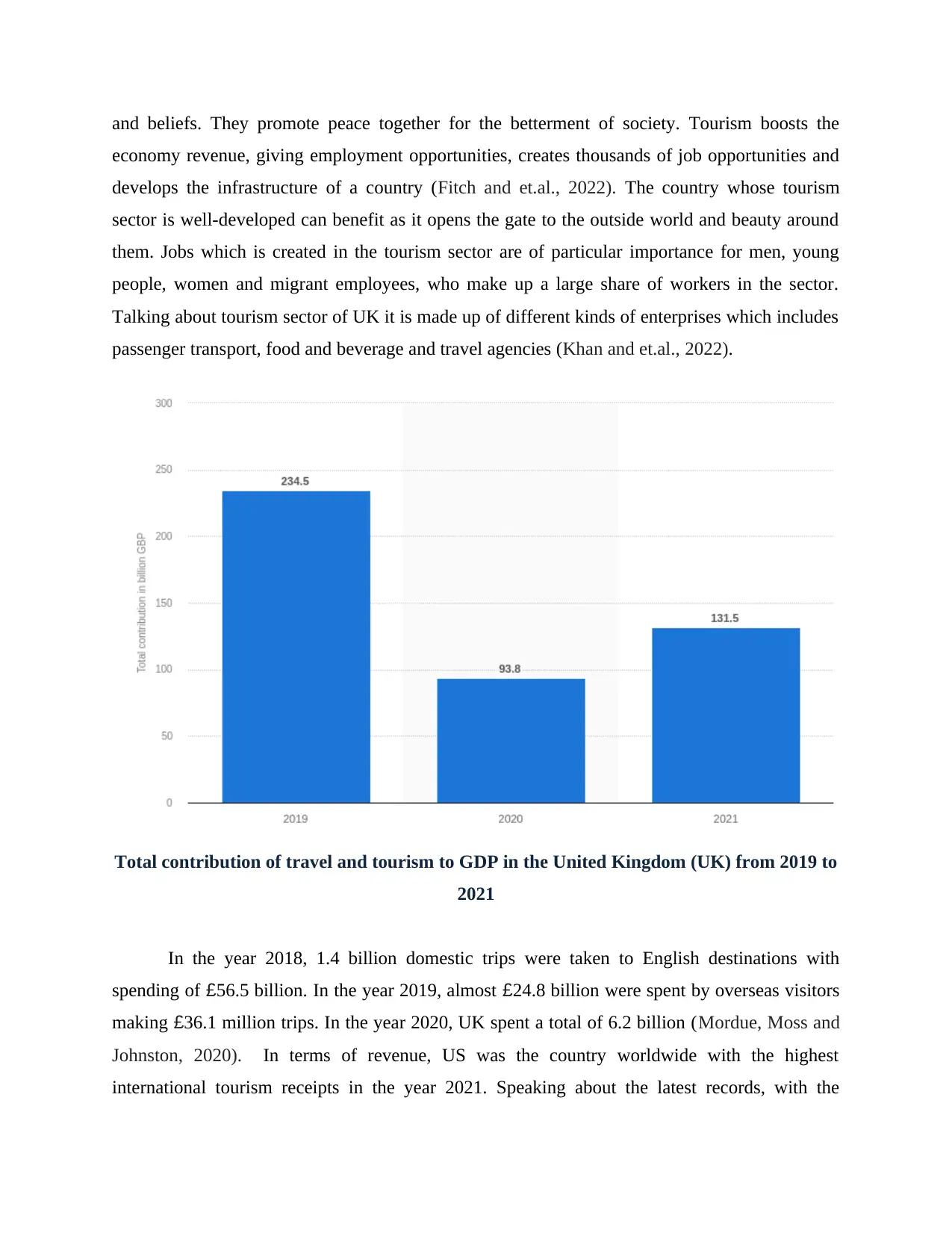
and beliefs. They promote peace together for the betterment of society. Tourism boosts the
economy revenue, giving employment opportunities, creates thousands of job opportunities and
develops the infrastructure of a country (Fitch and et.al., 2022). The country whose tourism
sector is well-developed can benefit as it opens the gate to the outside world and beauty around
them. Jobs which is created in the tourism sector are of particular importance for men, young
people, women and migrant employees, who make up a large share of workers in the sector.
Talking about tourism sector of UK it is made up of different kinds of enterprises which includes
passenger transport, food and beverage and travel agencies (Khan and et.al., 2022).
Total contribution of travel and tourism to GDP in the United Kingdom (UK) from 2019 to
2021
In the year 2018, 1.4 billion domestic trips were taken to English destinations with
spending of £56.5 billion. In the year 2019, almost £24.8 billion were spent by overseas visitors
making £36.1 million trips. In the year 2020, UK spent a total of 6.2 billion (Mordue, Moss and
Johnston, 2020). In terms of revenue, US was the country worldwide with the highest
international tourism receipts in the year 2021. Speaking about the latest records, with the
economy revenue, giving employment opportunities, creates thousands of job opportunities and
develops the infrastructure of a country (Fitch and et.al., 2022). The country whose tourism
sector is well-developed can benefit as it opens the gate to the outside world and beauty around
them. Jobs which is created in the tourism sector are of particular importance for men, young
people, women and migrant employees, who make up a large share of workers in the sector.
Talking about tourism sector of UK it is made up of different kinds of enterprises which includes
passenger transport, food and beverage and travel agencies (Khan and et.al., 2022).
Total contribution of travel and tourism to GDP in the United Kingdom (UK) from 2019 to
2021
In the year 2018, 1.4 billion domestic trips were taken to English destinations with
spending of £56.5 billion. In the year 2019, almost £24.8 billion were spent by overseas visitors
making £36.1 million trips. In the year 2020, UK spent a total of 6.2 billion (Mordue, Moss and
Johnston, 2020). In terms of revenue, US was the country worldwide with the highest
international tourism receipts in the year 2021. Speaking about the latest records, with the
⊘ This is a preview!⊘
Do you want full access?
Subscribe today to unlock all pages.

Trusted by 1+ million students worldwide
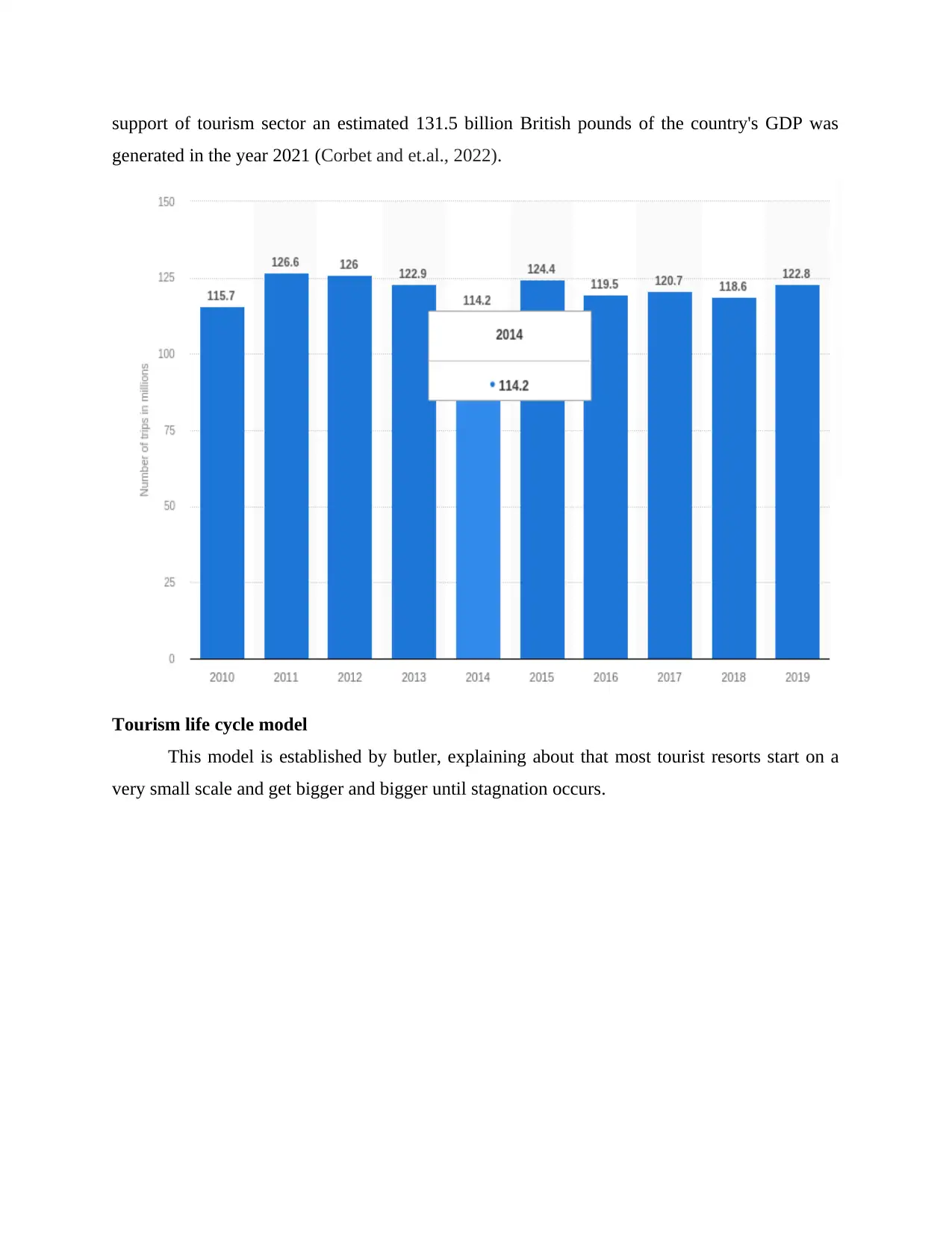
support of tourism sector an estimated 131.5 billion British pounds of the country's GDP was
generated in the year 2021 (Corbet and et.al., 2022).
Tourism life cycle model
This model is established by butler, explaining about that most tourist resorts start on a
very small scale and get bigger and bigger until stagnation occurs.
generated in the year 2021 (Corbet and et.al., 2022).
Tourism life cycle model
This model is established by butler, explaining about that most tourist resorts start on a
very small scale and get bigger and bigger until stagnation occurs.
Paraphrase This Document
Need a fresh take? Get an instant paraphrase of this document with our AI Paraphraser
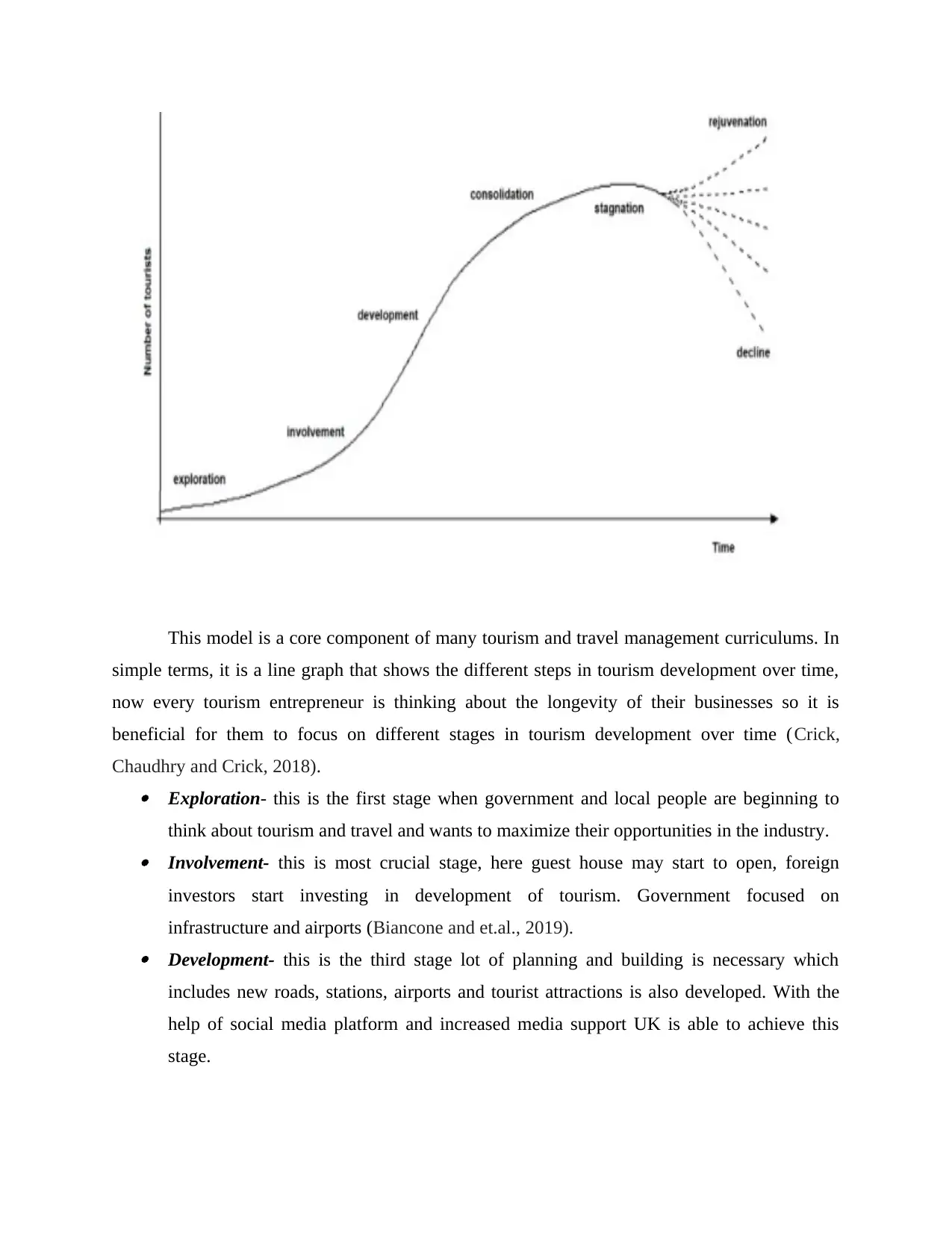
This model is a core component of many tourism and travel management curriculums. In
simple terms, it is a line graph that shows the different steps in tourism development over time,
now every tourism entrepreneur is thinking about the longevity of their businesses so it is
beneficial for them to focus on different stages in tourism development over time (Crick,
Chaudhry and Crick, 2018). Exploration- this is the first stage when government and local people are beginning to
think about tourism and travel and wants to maximize their opportunities in the industry. Involvement- this is most crucial stage, here guest house may start to open, foreign
investors start investing in development of tourism. Government focused on
infrastructure and airports (Biancone and et.al., 2019). Development- this is the third stage lot of planning and building is necessary which
includes new roads, stations, airports and tourist attractions is also developed. With the
help of social media platform and increased media support UK is able to achieve this
stage.
simple terms, it is a line graph that shows the different steps in tourism development over time,
now every tourism entrepreneur is thinking about the longevity of their businesses so it is
beneficial for them to focus on different stages in tourism development over time (Crick,
Chaudhry and Crick, 2018). Exploration- this is the first stage when government and local people are beginning to
think about tourism and travel and wants to maximize their opportunities in the industry. Involvement- this is most crucial stage, here guest house may start to open, foreign
investors start investing in development of tourism. Government focused on
infrastructure and airports (Biancone and et.al., 2019). Development- this is the third stage lot of planning and building is necessary which
includes new roads, stations, airports and tourist attractions is also developed. With the
help of social media platform and increased media support UK is able to achieve this
stage.
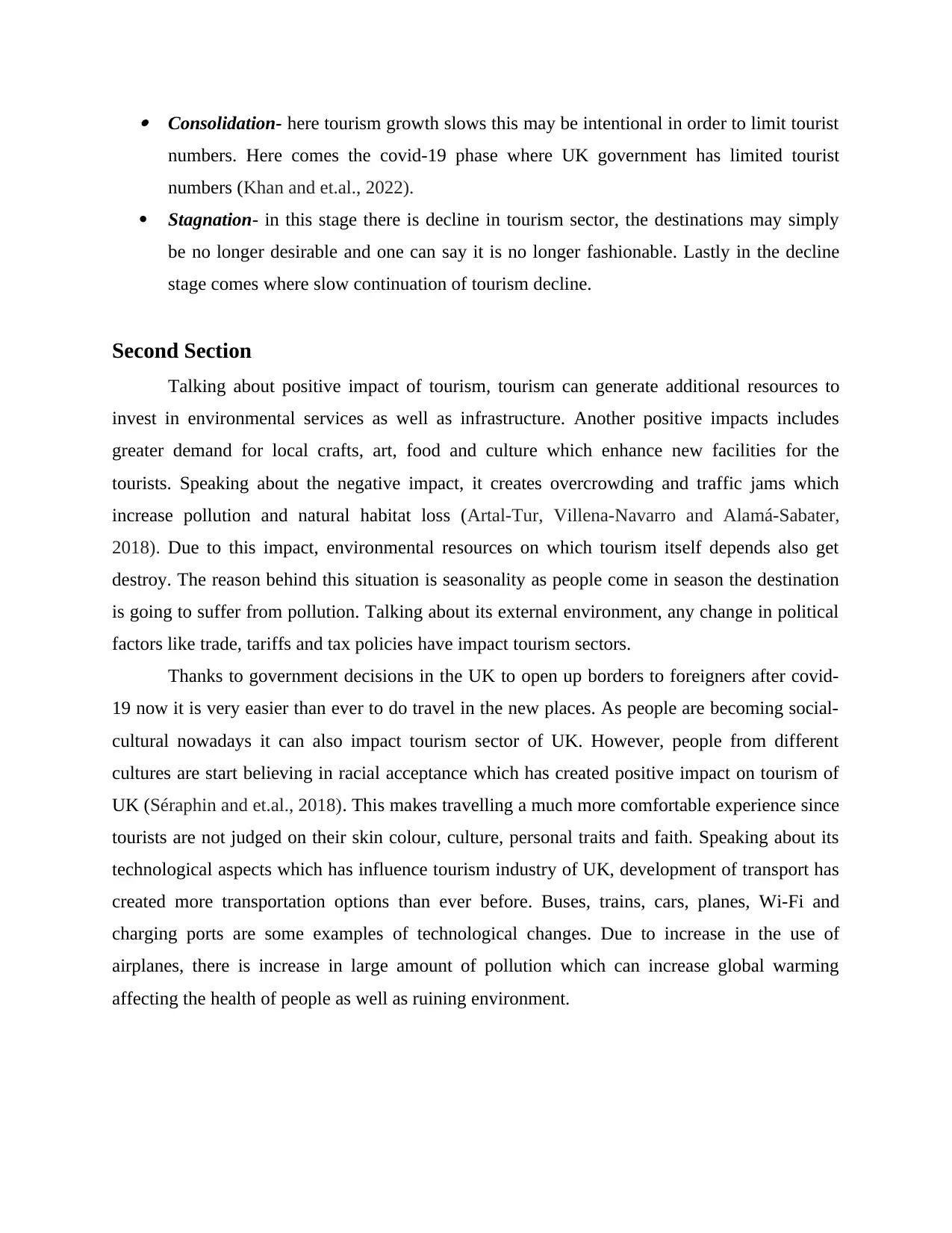
Consolidation- here tourism growth slows this may be intentional in order to limit tourist
numbers. Here comes the covid-19 phase where UK government has limited tourist
numbers (Khan and et.al., 2022).
Stagnation- in this stage there is decline in tourism sector, the destinations may simply
be no longer desirable and one can say it is no longer fashionable. Lastly in the decline
stage comes where slow continuation of tourism decline.
Second Section
Talking about positive impact of tourism, tourism can generate additional resources to
invest in environmental services as well as infrastructure. Another positive impacts includes
greater demand for local crafts, art, food and culture which enhance new facilities for the
tourists. Speaking about the negative impact, it creates overcrowding and traffic jams which
increase pollution and natural habitat loss (Artal-Tur, Villena-Navarro and Alamá-Sabater,
2018). Due to this impact, environmental resources on which tourism itself depends also get
destroy. The reason behind this situation is seasonality as people come in season the destination
is going to suffer from pollution. Talking about its external environment, any change in political
factors like trade, tariffs and tax policies have impact tourism sectors.
Thanks to government decisions in the UK to open up borders to foreigners after covid-
19 now it is very easier than ever to do travel in the new places. As people are becoming social-
cultural nowadays it can also impact tourism sector of UK. However, people from different
cultures are start believing in racial acceptance which has created positive impact on tourism of
UK (Séraphin and et.al., 2018). This makes travelling a much more comfortable experience since
tourists are not judged on their skin colour, culture, personal traits and faith. Speaking about its
technological aspects which has influence tourism industry of UK, development of transport has
created more transportation options than ever before. Buses, trains, cars, planes, Wi-Fi and
charging ports are some examples of technological changes. Due to increase in the use of
airplanes, there is increase in large amount of pollution which can increase global warming
affecting the health of people as well as ruining environment.
numbers. Here comes the covid-19 phase where UK government has limited tourist
numbers (Khan and et.al., 2022).
Stagnation- in this stage there is decline in tourism sector, the destinations may simply
be no longer desirable and one can say it is no longer fashionable. Lastly in the decline
stage comes where slow continuation of tourism decline.
Second Section
Talking about positive impact of tourism, tourism can generate additional resources to
invest in environmental services as well as infrastructure. Another positive impacts includes
greater demand for local crafts, art, food and culture which enhance new facilities for the
tourists. Speaking about the negative impact, it creates overcrowding and traffic jams which
increase pollution and natural habitat loss (Artal-Tur, Villena-Navarro and Alamá-Sabater,
2018). Due to this impact, environmental resources on which tourism itself depends also get
destroy. The reason behind this situation is seasonality as people come in season the destination
is going to suffer from pollution. Talking about its external environment, any change in political
factors like trade, tariffs and tax policies have impact tourism sectors.
Thanks to government decisions in the UK to open up borders to foreigners after covid-
19 now it is very easier than ever to do travel in the new places. As people are becoming social-
cultural nowadays it can also impact tourism sector of UK. However, people from different
cultures are start believing in racial acceptance which has created positive impact on tourism of
UK (Séraphin and et.al., 2018). This makes travelling a much more comfortable experience since
tourists are not judged on their skin colour, culture, personal traits and faith. Speaking about its
technological aspects which has influence tourism industry of UK, development of transport has
created more transportation options than ever before. Buses, trains, cars, planes, Wi-Fi and
charging ports are some examples of technological changes. Due to increase in the use of
airplanes, there is increase in large amount of pollution which can increase global warming
affecting the health of people as well as ruining environment.
⊘ This is a preview!⊘
Do you want full access?
Subscribe today to unlock all pages.

Trusted by 1+ million students worldwide

Third Section
Tourist behaviour is relatable to the consumer behaviour in purchasing and undertaking the
services and facilities within the tourist industry at large scale. There are high expectations of
tourists which is measured by the analysis of the travelling and tourist industry (Senbeto and
Hon, 2020). There is thus analysed and identified that the customers and expectations which are
related to services and facilities being undertaken and analysing the aspects which are related to
the tourism industry. There are expectations of the visitors that has been determined in the
tourism industry. Customers are aware of the tourism trends which are made available in the
market. The expectation of customers has created pressure in the tourism industry. There has
been negative impact of the visitors due to the tourist destinations in negative role. For example
– In Italy, the people who come from different places, have high expectations from the place and
this creates pressure on the local people (Artal-Tur, Villena-Navarro and Alamá-Sabater, 2018).
There are three main categories which have been identified in concern with typology of
tourist and these are – social, environmental and economic. There is high impact of these factors
on tourism industry. As tourism has increased of Italy, there is economic factor which has been
increasing. The pressure is being created on the tourists’ industry where the Italy is foremost
place which has been under the consequence of these factors which are social, economic and
environmental (Bowen, 2022). There are resources which have been exploited at large scale. The
local people are contributing towards the resources which are being exploited. There is thus
higher impact of tourism on the society which indicates that the social factors are also important
in significant manner. There are two types of motivation which are – Intrinsic and Extrinsic.
Intrinsic motivation is defined as the motivation which comes from within. Whereas, extrinsic
motivation is the type of motivation which comes from the surroundings. There are effective
services which are assured by the Italy and are provided to the customers in significant manner.
Therefore, positive impact has been created on the society which has helped in understanding the
concerns that the tourism industry has been impacted by the services and the facilities which are
provided to the visitors and the tourists (Chebli, 2020).
In order to ensure the effective services and facilities to be provided to the customers, it
becomes effective and significant to provide the best practices which is impacting the
environment and society. Thus, the tourism industry impacts the society in both positive and
Tourist behaviour is relatable to the consumer behaviour in purchasing and undertaking the
services and facilities within the tourist industry at large scale. There are high expectations of
tourists which is measured by the analysis of the travelling and tourist industry (Senbeto and
Hon, 2020). There is thus analysed and identified that the customers and expectations which are
related to services and facilities being undertaken and analysing the aspects which are related to
the tourism industry. There are expectations of the visitors that has been determined in the
tourism industry. Customers are aware of the tourism trends which are made available in the
market. The expectation of customers has created pressure in the tourism industry. There has
been negative impact of the visitors due to the tourist destinations in negative role. For example
– In Italy, the people who come from different places, have high expectations from the place and
this creates pressure on the local people (Artal-Tur, Villena-Navarro and Alamá-Sabater, 2018).
There are three main categories which have been identified in concern with typology of
tourist and these are – social, environmental and economic. There is high impact of these factors
on tourism industry. As tourism has increased of Italy, there is economic factor which has been
increasing. The pressure is being created on the tourists’ industry where the Italy is foremost
place which has been under the consequence of these factors which are social, economic and
environmental (Bowen, 2022). There are resources which have been exploited at large scale. The
local people are contributing towards the resources which are being exploited. There is thus
higher impact of tourism on the society which indicates that the social factors are also important
in significant manner. There are two types of motivation which are – Intrinsic and Extrinsic.
Intrinsic motivation is defined as the motivation which comes from within. Whereas, extrinsic
motivation is the type of motivation which comes from the surroundings. There are effective
services which are assured by the Italy and are provided to the customers in significant manner.
Therefore, positive impact has been created on the society which has helped in understanding the
concerns that the tourism industry has been impacted by the services and the facilities which are
provided to the visitors and the tourists (Chebli, 2020).
In order to ensure the effective services and facilities to be provided to the customers, it
becomes effective and significant to provide the best practices which is impacting the
environment and society. Thus, the tourism industry impacts the society in both positive and
Paraphrase This Document
Need a fresh take? Get an instant paraphrase of this document with our AI Paraphraser
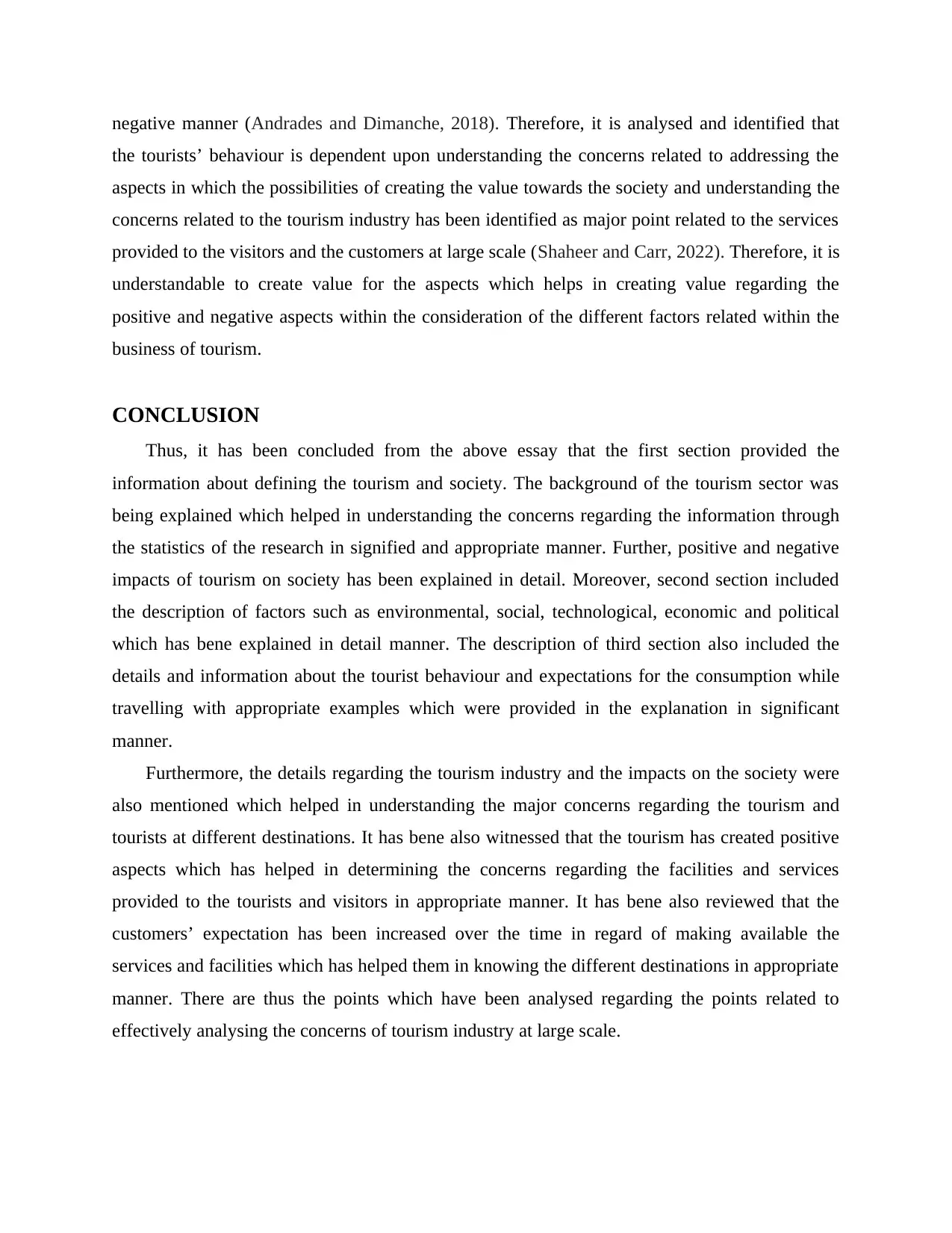
negative manner (Andrades and Dimanche, 2018). Therefore, it is analysed and identified that
the tourists’ behaviour is dependent upon understanding the concerns related to addressing the
aspects in which the possibilities of creating the value towards the society and understanding the
concerns related to the tourism industry has been identified as major point related to the services
provided to the visitors and the customers at large scale (Shaheer and Carr, 2022). Therefore, it is
understandable to create value for the aspects which helps in creating value regarding the
positive and negative aspects within the consideration of the different factors related within the
business of tourism.
CONCLUSION
Thus, it has been concluded from the above essay that the first section provided the
information about defining the tourism and society. The background of the tourism sector was
being explained which helped in understanding the concerns regarding the information through
the statistics of the research in signified and appropriate manner. Further, positive and negative
impacts of tourism on society has been explained in detail. Moreover, second section included
the description of factors such as environmental, social, technological, economic and political
which has bene explained in detail manner. The description of third section also included the
details and information about the tourist behaviour and expectations for the consumption while
travelling with appropriate examples which were provided in the explanation in significant
manner.
Furthermore, the details regarding the tourism industry and the impacts on the society were
also mentioned which helped in understanding the major concerns regarding the tourism and
tourists at different destinations. It has bene also witnessed that the tourism has created positive
aspects which has helped in determining the concerns regarding the facilities and services
provided to the tourists and visitors in appropriate manner. It has bene also reviewed that the
customers’ expectation has been increased over the time in regard of making available the
services and facilities which has helped them in knowing the different destinations in appropriate
manner. There are thus the points which have been analysed regarding the points related to
effectively analysing the concerns of tourism industry at large scale.
the tourists’ behaviour is dependent upon understanding the concerns related to addressing the
aspects in which the possibilities of creating the value towards the society and understanding the
concerns related to the tourism industry has been identified as major point related to the services
provided to the visitors and the customers at large scale (Shaheer and Carr, 2022). Therefore, it is
understandable to create value for the aspects which helps in creating value regarding the
positive and negative aspects within the consideration of the different factors related within the
business of tourism.
CONCLUSION
Thus, it has been concluded from the above essay that the first section provided the
information about defining the tourism and society. The background of the tourism sector was
being explained which helped in understanding the concerns regarding the information through
the statistics of the research in signified and appropriate manner. Further, positive and negative
impacts of tourism on society has been explained in detail. Moreover, second section included
the description of factors such as environmental, social, technological, economic and political
which has bene explained in detail manner. The description of third section also included the
details and information about the tourist behaviour and expectations for the consumption while
travelling with appropriate examples which were provided in the explanation in significant
manner.
Furthermore, the details regarding the tourism industry and the impacts on the society were
also mentioned which helped in understanding the major concerns regarding the tourism and
tourists at different destinations. It has bene also witnessed that the tourism has created positive
aspects which has helped in determining the concerns regarding the facilities and services
provided to the tourists and visitors in appropriate manner. It has bene also reviewed that the
customers’ expectation has been increased over the time in regard of making available the
services and facilities which has helped them in knowing the different destinations in appropriate
manner. There are thus the points which have been analysed regarding the points related to
effectively analysing the concerns of tourism industry at large scale.

⊘ This is a preview!⊘
Do you want full access?
Subscribe today to unlock all pages.

Trusted by 1+ million students worldwide
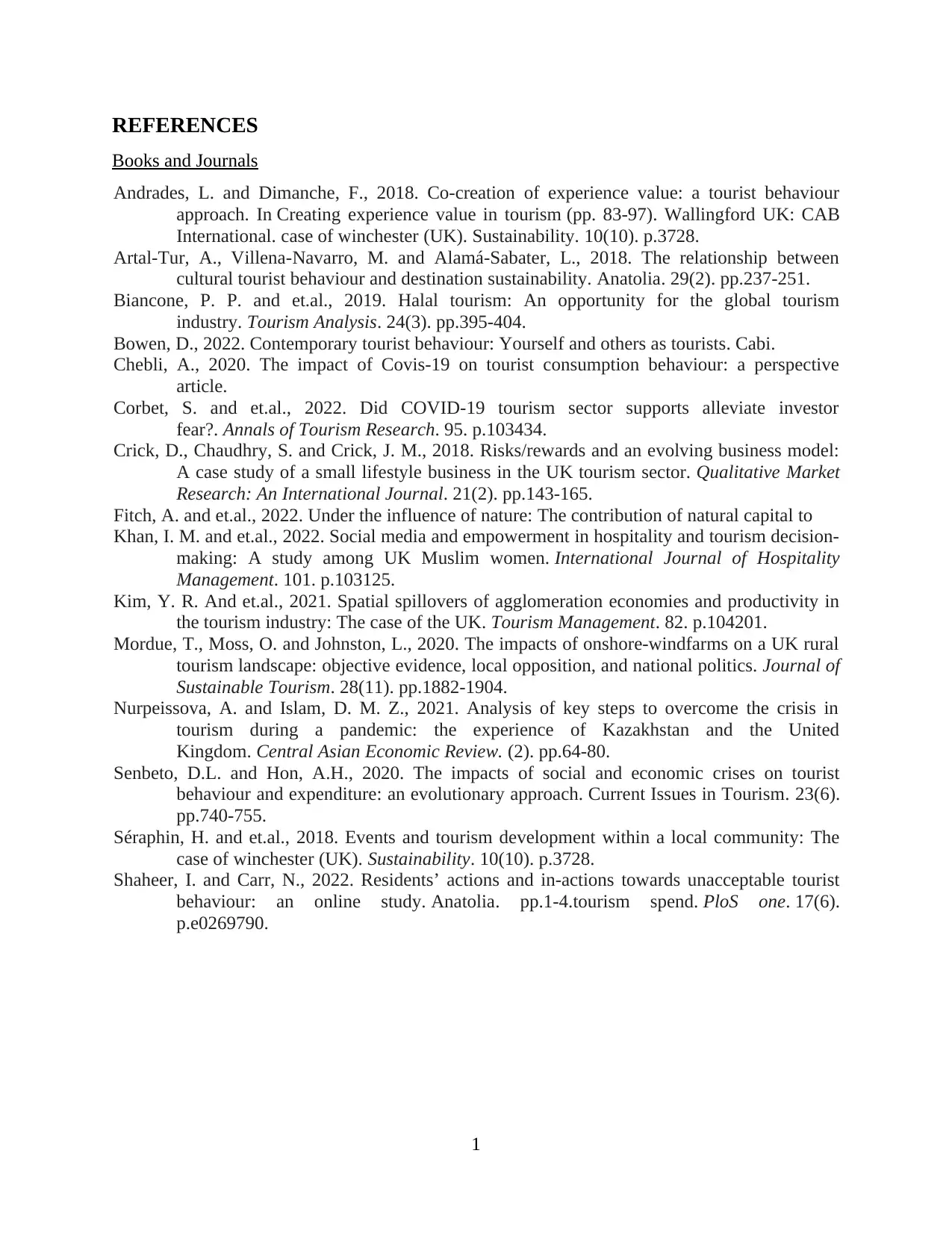
REFERENCES
Books and Journals
Andrades, L. and Dimanche, F., 2018. Co-creation of experience value: a tourist behaviour
approach. In Creating experience value in tourism (pp. 83-97). Wallingford UK: CAB
International. case of winchester (UK). Sustainability. 10(10). p.3728.
Artal-Tur, A., Villena-Navarro, M. and Alamá-Sabater, L., 2018. The relationship between
cultural tourist behaviour and destination sustainability. Anatolia. 29(2). pp.237-251.
Biancone, P. P. and et.al., 2019. Halal tourism: An opportunity for the global tourism
industry. Tourism Analysis. 24(3). pp.395-404.
Bowen, D., 2022. Contemporary tourist behaviour: Yourself and others as tourists. Cabi.
Chebli, A., 2020. The impact of Covis-19 on tourist consumption behaviour: a perspective
article.
Corbet, S. and et.al., 2022. Did COVID-19 tourism sector supports alleviate investor
fear?. Annals of Tourism Research. 95. p.103434.
Crick, D., Chaudhry, S. and Crick, J. M., 2018. Risks/rewards and an evolving business model:
A case study of a small lifestyle business in the UK tourism sector. Qualitative Market
Research: An International Journal. 21(2). pp.143-165.
Fitch, A. and et.al., 2022. Under the influence of nature: The contribution of natural capital to
Khan, I. M. and et.al., 2022. Social media and empowerment in hospitality and tourism decision-
making: A study among UK Muslim women. International Journal of Hospitality
Management. 101. p.103125.
Kim, Y. R. And et.al., 2021. Spatial spillovers of agglomeration economies and productivity in
the tourism industry: The case of the UK. Tourism Management. 82. p.104201.
Mordue, T., Moss, O. and Johnston, L., 2020. The impacts of onshore-windfarms on a UK rural
tourism landscape: objective evidence, local opposition, and national politics. Journal of
Sustainable Tourism. 28(11). pp.1882-1904.
Nurpeissova, A. and Islam, D. M. Z., 2021. Analysis of key steps to overcome the crisis in
tourism during a pandemic: the experience of Kazakhstan and the United
Kingdom. Central Asian Economic Review. (2). pp.64-80.
Senbeto, D.L. and Hon, A.H., 2020. The impacts of social and economic crises on tourist
behaviour and expenditure: an evolutionary approach. Current Issues in Tourism. 23(6).
pp.740-755.
Séraphin, H. and et.al., 2018. Events and tourism development within a local community: The
case of winchester (UK). Sustainability. 10(10). p.3728.
Shaheer, I. and Carr, N., 2022. Residents’ actions and in-actions towards unacceptable tourist
behaviour: an online study. Anatolia. pp.1-4.tourism spend. PloS one. 17(6).
p.e0269790.
1
Books and Journals
Andrades, L. and Dimanche, F., 2018. Co-creation of experience value: a tourist behaviour
approach. In Creating experience value in tourism (pp. 83-97). Wallingford UK: CAB
International. case of winchester (UK). Sustainability. 10(10). p.3728.
Artal-Tur, A., Villena-Navarro, M. and Alamá-Sabater, L., 2018. The relationship between
cultural tourist behaviour and destination sustainability. Anatolia. 29(2). pp.237-251.
Biancone, P. P. and et.al., 2019. Halal tourism: An opportunity for the global tourism
industry. Tourism Analysis. 24(3). pp.395-404.
Bowen, D., 2022. Contemporary tourist behaviour: Yourself and others as tourists. Cabi.
Chebli, A., 2020. The impact of Covis-19 on tourist consumption behaviour: a perspective
article.
Corbet, S. and et.al., 2022. Did COVID-19 tourism sector supports alleviate investor
fear?. Annals of Tourism Research. 95. p.103434.
Crick, D., Chaudhry, S. and Crick, J. M., 2018. Risks/rewards and an evolving business model:
A case study of a small lifestyle business in the UK tourism sector. Qualitative Market
Research: An International Journal. 21(2). pp.143-165.
Fitch, A. and et.al., 2022. Under the influence of nature: The contribution of natural capital to
Khan, I. M. and et.al., 2022. Social media and empowerment in hospitality and tourism decision-
making: A study among UK Muslim women. International Journal of Hospitality
Management. 101. p.103125.
Kim, Y. R. And et.al., 2021. Spatial spillovers of agglomeration economies and productivity in
the tourism industry: The case of the UK. Tourism Management. 82. p.104201.
Mordue, T., Moss, O. and Johnston, L., 2020. The impacts of onshore-windfarms on a UK rural
tourism landscape: objective evidence, local opposition, and national politics. Journal of
Sustainable Tourism. 28(11). pp.1882-1904.
Nurpeissova, A. and Islam, D. M. Z., 2021. Analysis of key steps to overcome the crisis in
tourism during a pandemic: the experience of Kazakhstan and the United
Kingdom. Central Asian Economic Review. (2). pp.64-80.
Senbeto, D.L. and Hon, A.H., 2020. The impacts of social and economic crises on tourist
behaviour and expenditure: an evolutionary approach. Current Issues in Tourism. 23(6).
pp.740-755.
Séraphin, H. and et.al., 2018. Events and tourism development within a local community: The
case of winchester (UK). Sustainability. 10(10). p.3728.
Shaheer, I. and Carr, N., 2022. Residents’ actions and in-actions towards unacceptable tourist
behaviour: an online study. Anatolia. pp.1-4.tourism spend. PloS one. 17(6).
p.e0269790.
1
1 out of 10
Related Documents
Your All-in-One AI-Powered Toolkit for Academic Success.
+13062052269
info@desklib.com
Available 24*7 on WhatsApp / Email
![[object Object]](/_next/static/media/star-bottom.7253800d.svg)
Unlock your academic potential
Copyright © 2020–2026 A2Z Services. All Rights Reserved. Developed and managed by ZUCOL.




